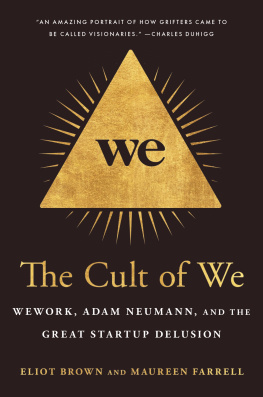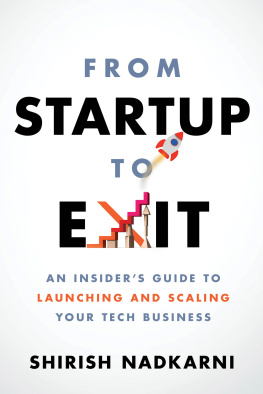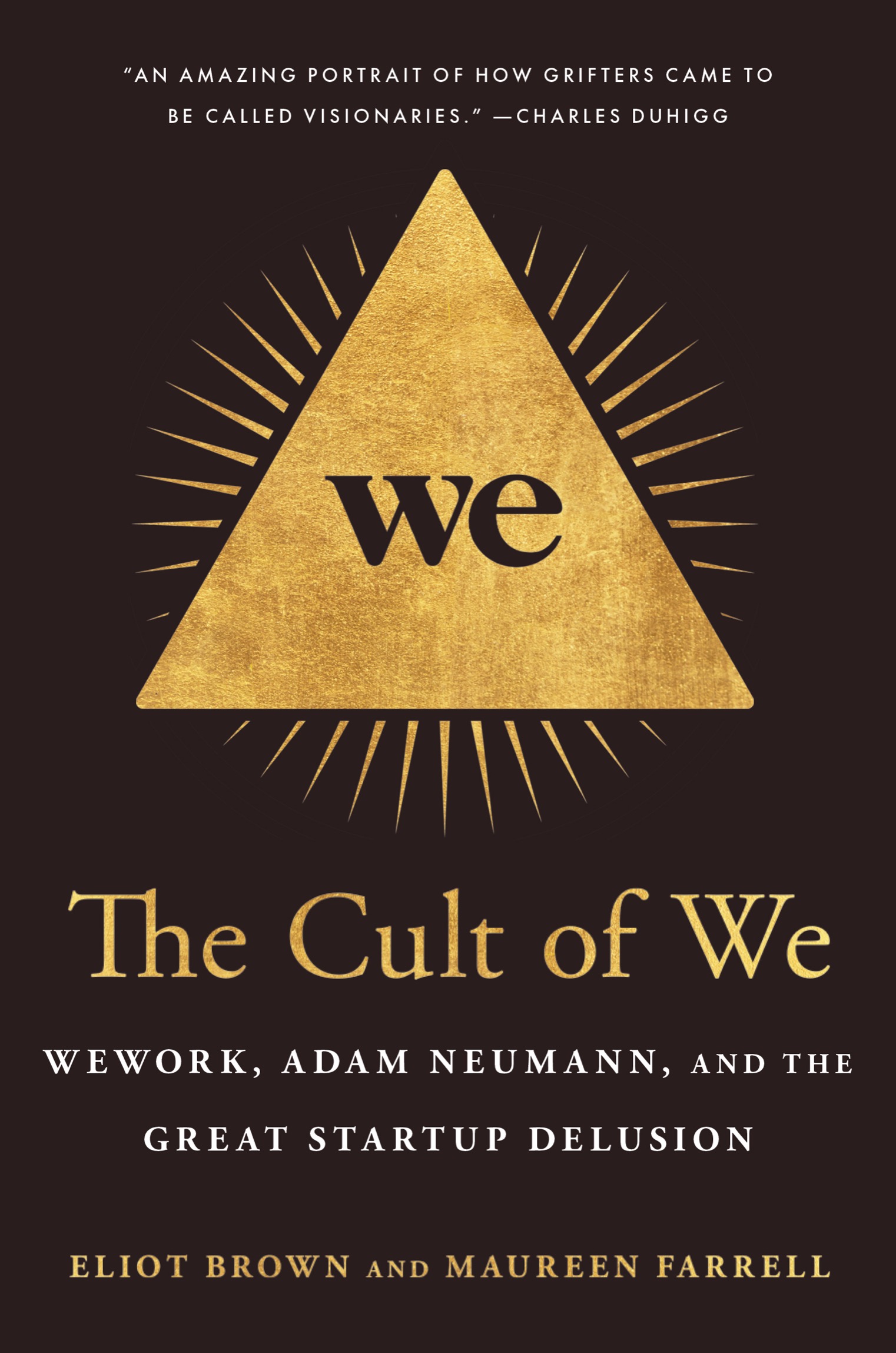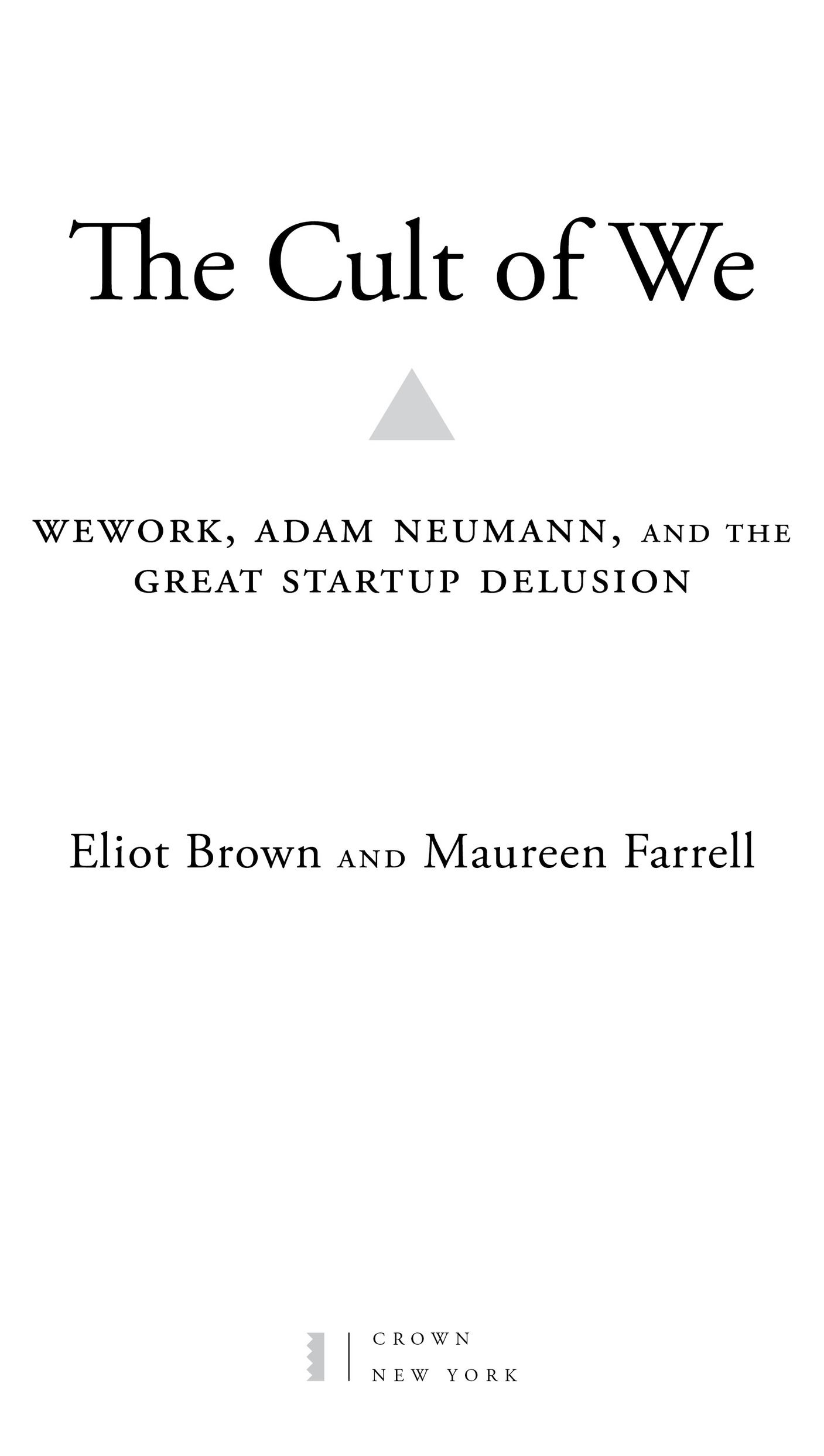Copyright 2021 by Eliot Brown and MMF Creative Inc.
All rights reserved.
Published in the United States by Crown , an imprint of Random House, a division of Penguin Random House LLC, New York.
Crown and the Crown colophon are registered trademarks of Penguin Random House LLC.
Built into the speculative episode is the euphoria, the mass escape from reality, that excludes any serious contemplation of the true nature of what is taking place.
Authors Note
The implosion of WeWork in September 2019 was an astounding moment in business. Nearly $40 billion in value on paper vanished, virtually overnight, as the investment world woke up to the reality that Americas most valuable startup wasnt a tech company but simply a real estate companyone that was losing more than $1.6 billion a year. Its charismatic, hard-partying CEO, once lionized as the archetype of the modern-day visionary startup founder, suddenly became a target for criticism, particularly for his self-enrichment. In the wake of the companys sudden unraveling, investors lost money, and employees lost their jobs; the CEO left rich.
As reporters covering the saga for The Wall Street Journal, we had seats at the forefront of this downfall, chronicling the company as it buckled, and unearthing new details that became part of the story of its collapse. Still, despite an extensive reporting effort at the time, we were left with countless key questions unanswered.
At the storys heart was a simple mystery. How did this happen? Why did some of the worlds top investors and bankers fall under the spell of this company? How did capitalism contort to view something so inherently simplea company leasing real estateas a disruptive tech startup valued higher than Fortune 500 companies like FedEx and Target? Was the WeWork story an outlier, or was it simply the most vivid example of a cultural rot that had formed within twenty-first-century entrepreneurial and investment culture?
In these pages, we attempt to answer these questions. While much was clear in public viewWeWorks CEO, Adam Neumann, raised too much money, set expectations too high, partied too hard, and, ultimately, flew far too close to the suna more complex tale lay in the underlying infrastructure that enabled the office subleasing companys rise and fall. WeWorks money trail led to the countrys top banks, to a Middle Eastern monarchy eager to transform its economy, to mutual funds hungry to get a piece of the Silicon Valley action. The trail led to an eccentric and insecure Tokyo tycoon who yearned to be taken seriously by the American technology elite. There was a whole system thirsting to believe in the vision of a messianic and charismatic founder and the profits he could seemingly deliver. Its a story about the toxic brew of confirmation bias, fuzzy math, and hubris. Its a story about what people will do when they are allowed to spend other peoples money with minimal oversight.
Our portrait of the WeWork saga draws on interviews with more than three hundred individuals who have shared their time, knowledge, experiences, and materials. It includes interviews with former and current WeWork executives, staff, and board members; SoftBank staff; bankers, advisers, investors, landlords, rivals, friends and family members of the Neumanns; SoftBank CEO Masayoshi Son; and numerous others. The vast majority of these people spoke on the condition that we would not reveal their identities as sources, with many citing nondisclosure agreements they signed with WeWork or other parties involved.
Neumann declined to sit for an interview for this book. Still, he was presented with the facts about him we intended to include, and through a representative, he provided feedback on a portion of those facts, which informed our writing.
Throughout the book, we refer to people by their surnames on second reference. To avoid confusion over Adam and Rebekah Neumann when they are mentioned in close proximity, we refer to her as Rebekah.
While many of these interviews were conducted in 2020, after WeWorks fall, this book is also the product of years of reporting for The Wall Street Journal. Eliot Brown covered WeWork first as a real estate reporter and then as a venture capital and startup reporter based in San Francisco, following the company as it came to embody the age of monstrous startups with enormous losses. Maureen Farrell watched its swift and unusual rise while covering IPOs and capital markets for the Journal in New York.
After Brown first met Adam Neumann in 2013, the company made Neumann available for a handful of meetings, and it also made other senior executives available for numerous on-the-record interviews over the years. The books endnotes detail the information obtained from those interviews, as well as facts drawn from others who agreed to speak on the record for this book.
Throughout the book, weve carefully reconstructed scenes and incorporated dialogue. A reader should not assume that a person quoted in a scene has spoken to us. We also have drawn on an extensive array of internal documents at WeWork, including board minutes, investor slide shows, financial presentations, contracts, tape and video recordings, emails, and photographs.
Every detail and conversation in this book has also been subjected to fact-checking, and throughout we have followed a cardinal rule weve learned as Wall Street Journal reporters: no surprises. The key people in this book have been made awareand given an opportunity to comment onthe revelations contained in these pages.
We owe a huge debt of gratitude to our sources, who in many cases have given us hours upon hours of their time, painstakingly walking us through their memories of these events. Without them, telling this storywhich we believe is a vital parable of the twenty-first-century economywould not have been possible.
Eliot Brown and Maureen Farrell
PROLOGUE
The Summit
The crowd filling the Microsoft Theater in downtown Los Angeles buzzed with anticipation. Technicians in the control room readied cameras and then unleashed a kaleidoscopic array of spotlights that lit up the theaterthe same one used for the Emmys. The roughly five thousand attendees began to rise from their seats, cheering and clapping their hands to the beat of a pulsating pop song.
Adam Neumann emerged.
Wearing a light blue button-down shirt with sleeves rolled up, black pants, and white sneakers, the high-octane thirty-nine-year-old jumped up and down with his hands outstretched, beckoning people to continue clapping. The crowd erupted. Some of the eight cameras that sprang into action put his face up on a giant screen behind him. If strangers had stumbled into the auditorium, they could be forgiven for mistaking Neumann for a talent show contestant, or perhaps a televangelist. He walked toward center stage pumping his fist.
It was January 8, 2019, and most of the youthful crowd was the staff of WeWork, the massive office space startup Neumann had co-founded nine years earlier. Neumann, six feet five with a mop of shoulder-length dark brown hair, had summoned most of the companys employees from around the world for a three-day confab called Global Summit. New recruits and veteran executives alike were tasked with soaking up a cascade of presentations extolling the companys virtues and its extraordinary growth. How WeWork was about people taking part in something greater than themselves, as the companys Israel-born co-founder often preached. How WeWork rental office space was about making a life, not just a living. How they were










